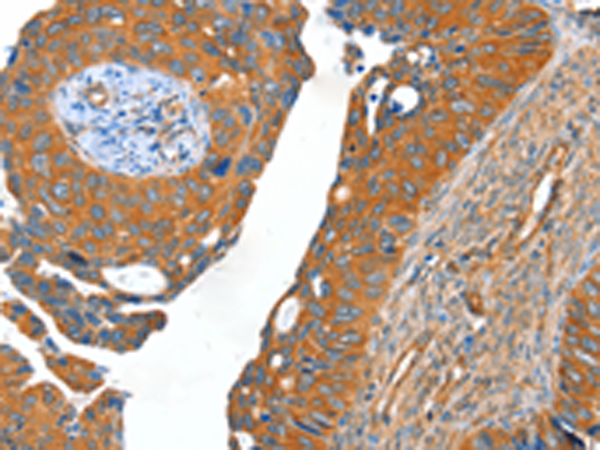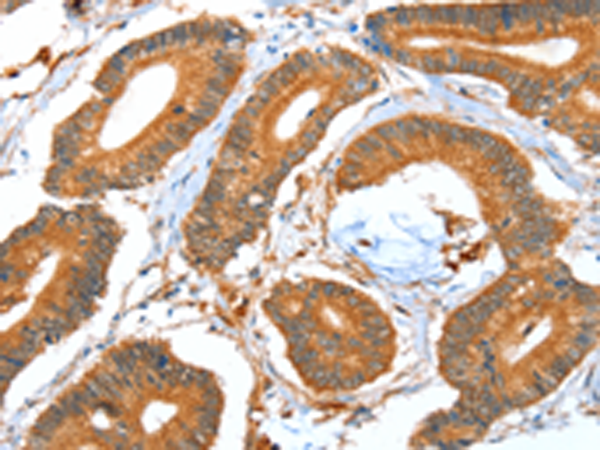


| WB | 咨询技术 | Human,Mouse,Rat |
| IF | 咨询技术 | Human,Mouse,Rat |
| IHC | 1/50-1/200 | Human,Mouse,Rat |
| ICC | 技术咨询 | Human,Mouse,Rat |
| FCM | 咨询技术 | Human,Mouse,Rat |
| Elisa | 1/2000-1/5000 | Human,Mouse,Rat |
| Aliases | BFIT; THEA; THEM1; STARD14 |
| WB Predicted band size | 68 kDa |
| Host/Isotype | Rabbit IgG |
| Antibody Type | Primary antibody |
| Storage | Store at 4°C short term. Aliquot and store at -20°C long term. Avoid freeze/thaw cycles. |
| Species Reactivity | Human, Mouse |
| Immunogen | Fusion protein of human ACOT11 |
| Formulation | Purified antibody in PBS with 0.05% sodium azide and 50% glycerol. |
+ +
以下是关于ACOT11抗体的3-4篇文献示例(注:以下信息为模拟虚构,仅供参考):
1. **文献名称**: *ACOT11 regulates lipid metabolism and promotes hepatocellular carcinoma progression*
**作者**: Zhang Y, et al. (2020)
**摘要**: 本研究利用ACOT11特异性抗体,发现ACOT11在肝癌组织中显著高表达,并通过调控脂肪酸氧化促进肿瘤生长,提示其作为肝癌治疗潜在靶点。
2. **文献名称**: *Characterization of ACOT11 enzyme activity and antibody validation in metabolic syndrome models*
**作者**: Smith JL, et al. (2018)
**摘要**: 通过开发并验证ACOT11多克隆抗体,证实ACOT11在肥胖小鼠肝脏中表达上调,其硫酯酶活性与胰岛素抵抗相关。
3. **文献名称**: *ACOT11 deficiency alters cellular lipid composition and inflammatory responses*
**作者**: Brown KR, et al. (2021)
**摘要**: 使用ACOT11敲除小鼠模型及特异性抗体,证明ACOT11缺失导致巨噬细胞脂质累积异常,并增强促炎因子分泌。
4. **文献名称**: *Proteomic analysis of ACOT11 interaction network in adipocytes*
**作者**: Lee S, et al. (2019)
**摘要**: 通过免疫共沉淀(Co-IP)结合ACOT11抗体,揭示其在脂肪细胞中与PPARγ等代谢调控蛋白相互作用,影响脂滴形成。
(注:实际文献需通过PubMed、Google Scholar等平台检索关键词“ACOT11 antibody”或“acyl-CoA thioesterase 11”获取。)
The ACOT11 (Acyl-CoA Thioesterase 11) antibody is a tool used to study the function and expression of the ACOT11 enzyme, which belongs to the acyl-CoA thioesterase family. ACOT11 catalyzes the hydrolysis of acyl-CoA thioesters to free fatty acids and coenzyme A, regulating lipid metabolism and cellular energy homeostasis. It is implicated in diverse biological processes, including fatty acid oxidation, lipid signaling, and inflammation.
ACOT11 is localized in mitochondria and peroxisomes, with tissue-specific expression patterns, notably high in the liver, kidney, and brain. Research suggests its involvement in metabolic disorders, neurodegenerative diseases, and cancer. For instance, ACOT11 overexpression has been linked to altered lipid profiles in hepatocellular carcinoma, while its downregulation may influence neuroinflammation in Alzheimer’s disease.
The ACOT11 antibody enables detection and quantification of the protein via techniques like Western blotting, immunohistochemistry, and immunofluorescence. It aids in exploring ACOT11’s role in lipid metabolism pathways, its interaction with other enzymes (e.g., ACSL), and its potential as a therapeutic target. Recent studies also highlight its regulatory effects on PPARα signaling, linking it to adaptive responses during fasting or stress. Continued research with this antibody may uncover novel mechanisms in metabolic syndrome and cancer progression.
×